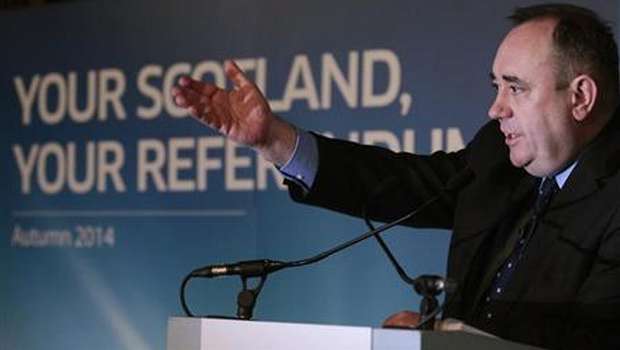
Scotland’s First Minister Alex Salmond gestures to journalists during a news conference in the Great Hall of Edinburgh castle, Scotland on January 25, 2012. (Reuters/David Moir)
London, Reuters—Separatist leader Alex Salmond insisted on Monday that Scotland would keep the pound if it left the UK and accused British politicians of bluffing by ruling out a currency union in a campaign of fear that would provoke a backlash from Scots.
Salmond is fighting a concerted attempt by London to prevent a “yes” verdict in a September 18 referendum on independence by undermining his central economic case that oil-rich Scotland could be a prosperous, independent nation.
As opinion polls start to show growing—though still minority—support for secession, the debate has intensified, with the twin pillars of Salmond’s plan—keeping the pound and negotiating European Union membership—shaken in recent days.
In an unprecedented move, the three main UK parties joined forces to rule out a currency union with an independent Scotland, and then European Commission President José Manuel Barroso warned that Scotland would find it extremely difficult if not impossible to gain European Union membership.
Salmond, a wily politician who has led the Scottish National Party (SNP) for almost 25 years, accused Westminster of launching a diplomatic offensive against independence and of trying to “dictate from on high,” an appeal to Scots’ dislike of being told what to do by southern politicians.
“It is a sign of how out-of-touch and arrogant the Westminster establishment has become,” Scotland’s first minister told business leaders in Aberdeen, adding it was to the benefit of both sides of the border to have a shared currency.
“What is said by Westminster during the heat of a political campaign will differ from the reality of life after the referendum,” he added.
Salmond’s deputy, Nicola Sturgeon, said Barroso’s stance was “preposterous.”
The currency has become a key battlefield in the debate, with London arguing that if Scotland walks away from the UK after 307 years, it walks away from the pound too. Salmond says the pound is “as much Scotland’s as the rest of the UK.”
He has warned that if Scotland does not have access to the assets it shares with the UK, it is under no obligation to take a slice of the UK’s 1.2 trillion pound (1.99 trillion US dollar) debt.
Salmond said the rest of UK was also at risk of losing millions of pounds if it refused to let Scotland use the pound, due to foreign exchange risks and currency transaction costs as the two countries are major trading partners.
He dubbed this charge on British business the “George tax” after British finance minister George Osborne.
But Osborne himself hit back at Salmond after the speech.
“We were promised a detailed response to the economic arguments that [we] made last week, but instead we got an empty speech,” he said in a statement. “It’s now even clearer that Alex Salmond is a man without a plan.”
With Salmond refusing to produce a Plan B for the currency, a poll by YouGov showed the row had caused a 15 percent rise in opposition to a currency union in the rest of the UK, with 58 percent opposing the plan and 23 percent in favor.
But Salmond said Westminster’s blunt stance in a campaign he calls “Project Fear” had created a negative reaction among Scots.
“To be told that there are things we can’t do will certainly elicit a Scottish response that is as resolute as it is uncomfortable for the no campaign—it is yes we can,” he said.
Salmond played down Barroso’s comments, saying no EU member state had indicated it would seek to block Scottish membership, particularly as Scotland was an eager member of the bloc, unlike the rest of the UK which is debating a vote on EU membership.
However, Scotland would need to get backing from all 28 EU states for its membership and could meet resistance from Spain, which would not want to encourage separatists as it battles an independence bid by Catalans, who would also seek to re-apply to the bloc if they broke away from Spain.
“The decision is one for member states, but not to recognize the democratic will of Scotland would run counter to the entire EU European ideal of democratic expression and inclusion,” Salmond said.
